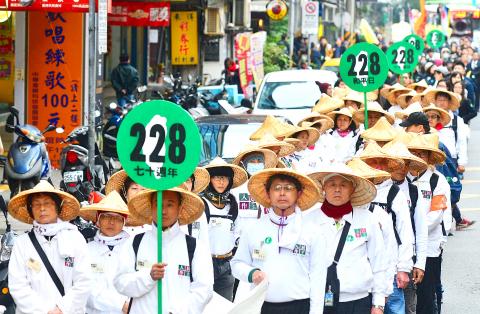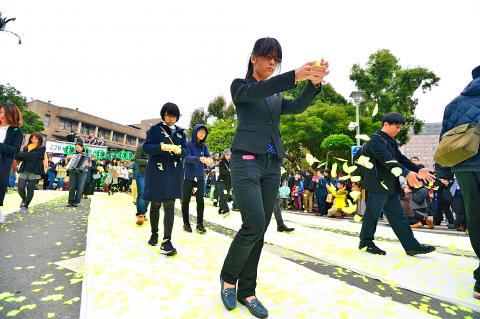Hundreds of campaigners marched in Taipei yesterday to commemorate the 228 Incident, calling for the government to officially assign responsibility for the massacre which followed a 1947 protest.
Escalating protests swept Taiwan on Feb. 28, 1947, after Tobacco Monopoly Bureau agents confiscated contraband cigarettes from a woman outside Taipei’s Tianma Tea House (天馬茶房) on Nanjing W Road on Feb. 27. When the woman was hit on the head by an officer holding a gun, the crowd surrounded the agents, who responded by fleeing with one agent shooting into the crowd and killing a bystander.
A subsequent bloody crackdown by the then-Chinese Nationalist Party (KMT) regime systematically killed many Taiwanese.

Photo: Wang Yi-song, Taipei Times
Only partial documentation of the events and victims has been recovered, with the government-funded 228 Memorial Foundation officially recognizing more than 2,200 victims.
More than 26 groups were represented at yesterday’s march through key historic sites, but no individual banners were raised.
Campaigners solemnly read out the names of those who were killed or went missing in the Incident.

Photo: Wang Yi-song, Taipei Times
“As the victims are gradually forgotten, Feb. 28 has diminished into a holiday lacking emotion,” Nylon Cheng Liberty Foundation managing director Cheng Tsing-hua (鄭清華) said. “We are still at the starting line in terms of discovering the truth, because the identities of many victims and perpetrators are unknown.”
He called for the government to hasten passage of transitional justice legislation, which would establish a special committee with powers to investigate the Incident and other injustices under the then-KMT authoritarian rule.
Government discussions over the fate of the National Chiang Kai-shek (蔣介石) Memorial Hall were “more symbolic than substantial,” he said.
“The victims of the 228 Incident are not just those listed, its greatest victim was Taiwan itself, including the descendants of the perpetrators,” he said. “Without the truth, we do not have the preconditions for forgiveness.”
Cheng is a brother of democracy movement pioneer Deng Nan-jung (鄭南榕), who in 1987 spearheaded a national campaign for Feb. 28 to be designated a national holiday shortly after the lifting of martial law.
Veteran activists Chen Yung-hsing (陳永興) and Lee Sheng-hsiung (李勝雄), who collaborated with Deng, led yesterday’s procession as it wound its way from Nanjing W Road to the Executive Yuan, where troops fired into a crowd of protesters during the massacre. The building served as the headquarters of then-Taiwan Governor Chen Yi (陳儀).
The march also passed the former site of a Tobacco Monopoly Bureau office which was sacked the same day, and a radio station building which was occupied and used to spread word of the protests.
The procession concluded with a prayer and singing while participants scattered satin flower petals over white cloth to symbolize mourning.

AGING: As of last month, people aged 65 or older accounted for 20.06 percent of the total population and the number of couples who got married fell by 18,685 from 2024 Taiwan has surpassed South Korea as the country least willing to have children, with an annual crude birthrate of 4.62 per 1,000 people, Ministry of the Interior data showed yesterday. The nation was previously ranked the second-lowest country in terms of total fertility rate, or the average number of children a woman has in her lifetime. However, South Korea’s fertility rate began to recover from 2023, with total fertility rate rising from 0.72 and estimated to reach 0.82 to 0.85 by last year, and the crude birthrate projected at 6.7 per 1,000 people. Japan’s crude birthrate was projected to fall below six,

Conflict with Taiwan could leave China with “massive economic disruption, catastrophic military losses, significant social unrest, and devastating sanctions,” a US think tank said in a report released on Monday. The German Marshall Fund released a report titled If China Attacks Taiwan: The Consequences for China of “Minor Conflict” and “Major War” Scenarios. The report details the “massive” economic, military, social and international costs to China in the event of a minor conflict or major war with Taiwan, estimating that the Chinese People’s Liberation Army (PLA) could sustain losses of more than half of its active-duty ground forces, including 100,000 troops. Understanding Chinese

US President Donald Trump in an interview with the New York Times published on Thursday said that “it’s up to” Chinese President Xi Jinping (習近平) what China does on Taiwan, but that he would be “very unhappy” with a change in the “status quo.” “He [Xi] considers it to be a part of China, and that’s up to him what he’s going to be doing, but I’ve expressed to him that I would be very unhappy if he did that, and I don’t think he’ll do that. I hope he doesn’t do that,” Trump said. Trump made the comments in the context

SELF-DEFENSE: Tokyo has accelerated its spending goal and its defense minister said the nation needs to discuss whether it should develop nuclear-powered submarines China is ramping up objections to what it sees as Japan’s desire to acquire nuclear weapons, despite Tokyo’s longstanding renunciation of such arms, deepening another fissure in the two neighbors’ increasingly tense ties. In what appears to be a concerted effort, China’s foreign and defense ministries issued statements on Thursday condemning alleged remilitarism efforts by Tokyo. The remarks came as two of the country’s top think tanks jointly issued a 29-page report framing actions by “right-wing forces” in Japan as posing a “serious threat” to world peace. While that report did not define “right-wing forces,” the Chinese Ministry of Foreign Affairs was